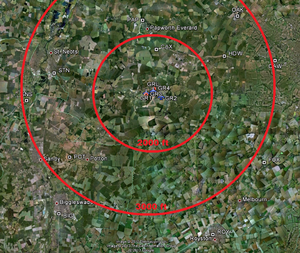Difference between revisions of "CUGC Micro-tasks"
(Add from testing.cugc.org.uk) |
(No difference)
|
Revision as of 17:31, 11 January 2018
These tasks are all within local soaring which means that you do not need a Cross-Country Endorsement to attempt them. These tasks are intended to stretch early solo pilots and teach them about cross-country flying. They also allow pilots without a cross country endorsement to participate in the BGA Ladder and Cuppers competitions.
Always ask an instructor before doing any of these tasks!
Contents
Easy tasks
These are simple out and return tasks to nearby turn points, to get you used to being outside the local circuit area on your own. There will always be an appropriate choice regardless of wind direction:
- Gransden Lodge - Caxton Gibbet - Gransden Lodge
- Gransden Lodge - Papworth - Gransden Lodge
- Gransden Lodge - Hardwick - Gransden Lodge
- Gransden Lodge - Potton - Gransden Lodge
- Gransden Lodge - St Neots - Gransden Lodge
Medium tasks
The medium tasks come in two types: out and returns over a greater distance (up to the limits of local soaring), to get you comfortable a bit further out, and small triangles to practice flying between turn points without routing via the airfield.
- Gransden Lodge - Caxton Gibbet - Hardwick - Gransden Lodge
- Gransden Lodge - Oakington - Gransden Lodge
- Gransden Lodge - Cambridge West - Gransden Lodge
- Gransden Lodge - Foxton - Gransden Lodge
- Gransden Lodge - St Neots - Papworth - Gransden Lodge
- Gransden Lodge - Potton - St Neots - Gransden Lodge
Hard tasks
The hard tasks push to the edge of what is possible with local soaring. Larger triangles of different shapes, often involving flying cross-wind, so you need to be more aware of your position. By the time you've finished all of these you should be able to recognise the local landmarks approaching Gransden from 15k away in all directions – useful for when you do your first cross-countries!
- Gransden Lodge - Potton - Oakington - Gransden Lodge
- Gransden Lodge - St Neots South - Cambridge West - Gransden Lodge
- Gransden Lodge - Papworth - Cambridge West - Gransden Lodge
- Gransden Lodge - Cambridge West - Foxton - Gransden Lodge
Turnpoints to avoid
Royston (ROY)
Due to airspace, turns over Royston must be between 3,500 ft and 4,200 ft QFE. It would be difficult for an inexperienced pilot to stay in the allowed height band for the required time to reach the turn point and return.
Biggleswade (BIG)
Due to airspace, is not possible to turn over Biggleswade turn point under local soaring rules.
